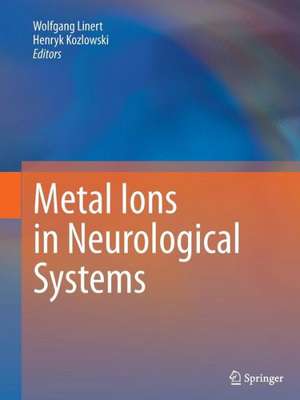Metal Ions in Neurological Systems
Editat de Wolfgang Linert, Henryk Kozlowskien Limba Engleză Paperback – 9 noi 2014
| Toate formatele și edițiile | Preț | Express |
|---|---|---|
| Paperback (1) | 950.52 lei 6-8 săpt. | |
| SPRINGER VIENNA – 9 noi 2014 | 950.52 lei 6-8 săpt. | |
| Hardback (1) | 820.12 lei 38-44 zile | |
| SPRINGER VIENNA – 16 oct 2012 | 820.12 lei 38-44 zile |
Preț: 950.52 lei
Preț vechi: 1159.17 lei
-18% Nou
Puncte Express: 1426
Preț estimativ în valută:
181.88€ • 190.58$ • 150.36£
181.88€ • 190.58$ • 150.36£
Carte tipărită la comandă
Livrare economică 12-26 aprilie
Preluare comenzi: 021 569.72.76
Specificații
ISBN-13: 9783709116784
ISBN-10: 3709116783
Pagini: 260
Ilustrații: XIV, 246 p.
Dimensiuni: 210 x 279 x 14 mm
Greutate: 0.59 kg
Ediția:2012
Editura: SPRINGER VIENNA
Colecția Springer
Locul publicării:Vienna, Austria
ISBN-10: 3709116783
Pagini: 260
Ilustrații: XIV, 246 p.
Dimensiuni: 210 x 279 x 14 mm
Greutate: 0.59 kg
Ediția:2012
Editura: SPRINGER VIENNA
Colecția Springer
Locul publicării:Vienna, Austria
Public țintă
ResearchCuprins
1. R.R. Crichton, D.T. Dexter, R.J. Ward: Brain iron metabolism and its perturbation in neurological diseases.- 2. E. Milward et al.: Brain changes in iron loading disorders.- 3. I. Paris, J. Segura-Aguilar: The role of metal ions in dopaminergic neuron degeneration in Parkinsonism and Parkinson’s disease.- 4. E. Siakkou, G.N.L. Jameson: Iron, cysteine and neurodegeneration during Parkinson’s disease.- 5. G. Crisponi et al.: Copper uptake and trafficking in the brain.- 6. Y. Nishida: Prion diseases and manganism.- 7. A. Granzotto, P. Zatta: Metal ions and beta-amyloid: conformational modifications and biological aspects.- 8. A. Granzotto et al.: Beta-amyloid toxicity increases with hydrophobicity in the presence of metal ions.- 9. Ch. Exley, E.R. House: Aluminium in the human brain.- 10. V.M. Nurchi, G. Crisponi, V. Bertolasi, G. Faa, M. Remelli: Aluminium dependent human diseases and chelating properties of aluminium chelatots for bio-medical applications.-11. M. Suwalsky P.L. Henrnandez, C.P. Sotomayor: Aluminum increases toxic effects of amyloid beta-peptides on human erythrocyte membrane and molecular models.- 12. E. Gaggelli, G. Valensin: Oxidative stress in neurodegeneration: targeting mitochondria as a therapeutic aid.- 13. Y. Nishsida: The chemical process of oxidative stress by copper(II) and iron(III) ions in several neurodegenerative disorders.- 14. O.G. Tsay, K. Kim, D.G. Churchil: Metal ion role in the CNS under toxic organophosphonate exposure: Traces of understanding and various open questions.- 15. S. Casito, M. Aschner: Heavy metals, behavior and neurodegeneration: Using C elegans to untangle a can of warms.- 16. C. Kallay et al.: The effect of point mutations on copper(II) complexes with peptide fragments encompassin the 106-114 region of human prion protein.- 17. E. Sija et al.: Interactions of pyridinecarboxylix acid chelators with brain metal ions: Cu(II), Zn(II), Al(III).- 18. S. Bohic et al.: Spatially resolved imagingmethods to probe metals in brain.- 19. Y. Ha, O. Tsay, D.G. Churchil: ICP-MS for the neurodegenerative and brain sciences.
Textul de pe ultima copertă
Metal ions in the brain are a necessity as well as a poison. The presence of metal ions in the active sites of biological catalysts or metalloproteins and in the biological functioning of nucleic acids is very well documented and they are required for brain activity. On the other hand, metals are very effective in generating oxidative stress. This effect does not only play a role in immunology but also is the root of practically all neurodegenerative disorders by inducing disease via the death of neurons. Managing metal ions in the brain could therefore be an important strategy in the search for therapeutic agents used in the treatment of neurodegenerative diseases. This new title gives an overview to key topics in the area of metal ions in the brain. It focuses on the role of metal ions in neurological systems by describing their advantageous functions as well as their poisonous features. It is therefore of interest for scientists in biochemistry and biophysics, physiology, toxicology as well as for physicians focused on this topic.
Caracteristici
Provides up to date knowledge about the effects of metal ions in the brain Discusses the basic biology and pathological disorders Focuses on selected topics dealing with the necessity and hams of metal ions in the brain Includes supplementary material: sn.pub/extras



